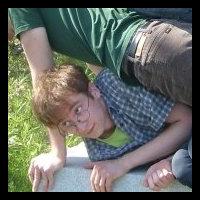Wpisy: 29
Język: English
Abras (Pokaż profil) 4 marca 2009, 20:15:12
Mi nomiĝas Abraham Kurp, kaj mi estas nova. Mia kromnomoj estas Abras kaj Abe.
Mi studis la lingvan Latinon en lernejo dum du jaroj. Mi amis ĝin, sed ĝi estas tre malfacila. Do mi decidis lerni Esperanton anstataŭe. Mi lernis Esperanto dum proksimume du semajnoj. Mi deziras lerni "more".
Ĉu mi skribas Esperante sufiĉe bone?
----------------------------------------
And here's what I was trying to say:
Greetings everyone,
I am named Abraham Kurp, and I am new. My nicknames are Abras and Abe.
I studied the Latin language in school for two years. I loved it, but it is very difficult. So I decided to learn Esperanto instead. I learned Esperanto for approximately two weeks. I want to learn more.
Do I write in Esperanto sufficiently well?
----------------------------------------
And now I have a few questions:
Is "dum" the correct word for "for" in this situation? I'm still a bit confused by all those small, connector words.
How do I say "more" in that situation above?
Also, how do you say "on the television" in Esperanto? (as in, "What program/show is on?")
Anyways, thanks for your time and I'm glad to be here. I'm very excited about learning more and getting to know you all using Esperanto.
Ĝis,
Abe
PS Feel free to correct my Esperanto here and in future posts -- I'm here to learn after all.
PPS Is there an accepted way of writing "PS" (ie post scriptum) in Esperanto?
KoLonJaNo (Pokaż profil) 4 marca 2009, 21:02:18
Abras:Saluton ĉiuj,Saluton, ĉiuj! or Saluton al ĉiuj!
Mia kromnomoj estas Abras kaj Abe.Miaj ...
Mi studis la lingvan Latinon en lernejo dum du jaroj.... lernis ... lingvon latinan | latinan lingvon ...
Mi lernis Esperanto dum proksimume du semajnoj.Hm. Did you really mean
I learned Esperanto for approximately two weeks.
instead of
I have been learning ... ?
If so, the Esperanto sentence is correct.
If you started two weeks ago and are still learning now it should be:
Mi eklernis Esperanton antaŭ ĉirkaŭ du semajnoj.
Mi deziras lerni "more".Two options:
a) ... pli. = (I want to learn) more (of it)
b) ... plu. = (I want to) keep on (learning)
Ĉu mi skribas Esperante sufiĉe bone?Very well considering you spent (have been spending) only two weeks learning the language.

Is "dum" the correct word for "for" in this situation? I'm still a bit confused by all those small, connector words.s.a.
How do I say "more" in that situation above?s.a.
Also, how do you say "on the television" in Esperanto? (as in, "What program/show is on?")Perhaps: Kio okazas en la televido?
PS Feel free to correct my Esperanto here and in future posts -- I'm here to learn after all.Done that.

PPS Is there an accepted way of writing "PS" (ie post scriptum) in Esperanto?The word is postskribo and I think using PS or even PPS (for postpostskribo) is O.K.
Greeings from Cologne,
Kolonjano
Miland (Pokaż profil) 4 marca 2009, 21:14:14
Your Latin background has clearly given you the potential to become a very strong Esperantist, so keep at it. Good luck!
andogigi (Pokaż profil) 4 marca 2009, 23:56:00
roint (Pokaż profil) 5 marca 2009, 03:06:10
Mi lernis latinan dum gimnazio, kaj decidis eklerni esperanton anstataŭ post nur unu jaro de ĝi. Mi malŝategis kiel svaga la gramatiko povas esti. Sed mi preferus paroli amikajn, vivantajn personojn ol legi pri frenezegaj pramilitregantoj ĉiukaze! Bonŝancon kun via lernado!
(I'm also a beginner so don't expect that translation to be totally correct
 )
) Abras (Pokaż profil) 5 marca 2009, 06:12:05

I'm really enjoying myself both with the language and the community attached to it. And with that kind of motivation I'm sure I'll be chatting in the Esperanto sections of this forum in no time at all!!
Rogir (Pokaż profil) 5 marca 2009, 11:41:23
Frankouche (Pokaż profil) 5 marca 2009, 11:55:16

So, we are waiting you for your second thread.
Miland (Pokaż profil) 5 marca 2009, 14:04:23
Abras:I'm sure I'll be chatting in the Esperanto sections of this forum in no time at all!!Go for it, but it is a good idea to learn the basics of grammar first. People who dive into the Esperanto-language forums without having done that are liable to make mistakes right and left. Esperanto grammar is designed to be easier than that of other languages, but that doesn't mean there isn't any. Therefore thoroughly go through the courses Ana Pana, Ana Renkontas and, last but not least, Gerda Malaperis. You should be ready for the basic language exam, as well as the easier parts of the Esperanto-language forums after these.
Abras (Pokaż profil) 5 marca 2009, 20:19:23




